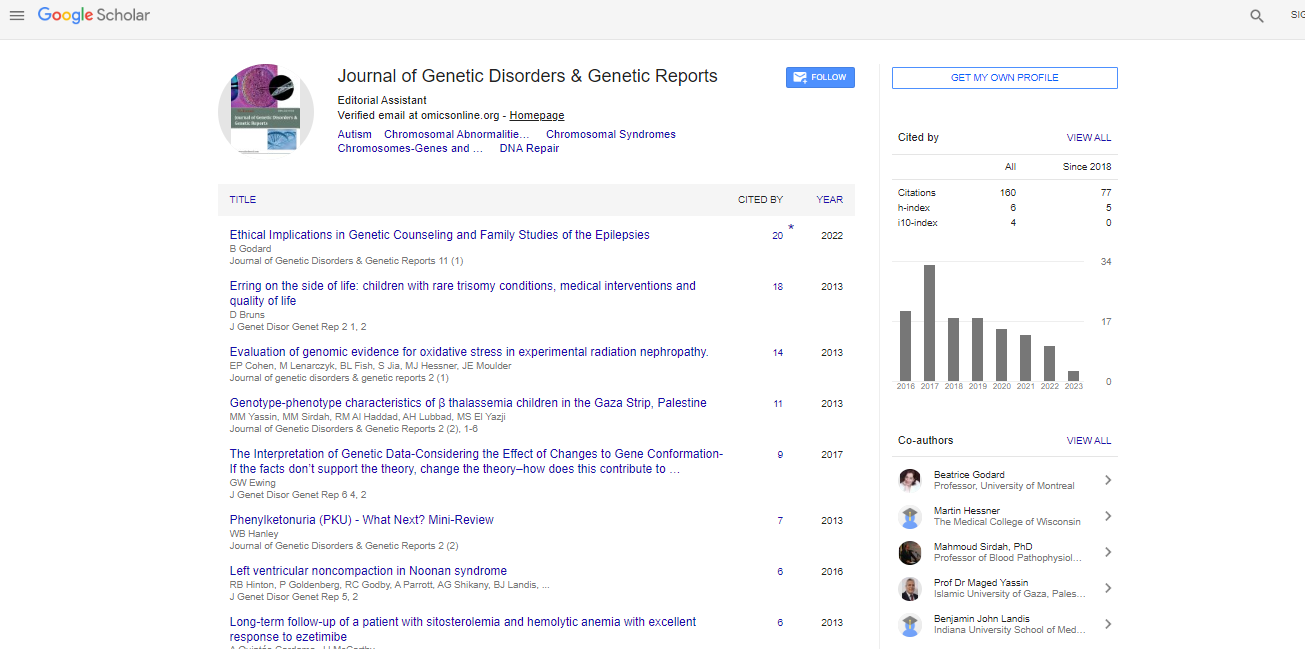Perspective, Vol: 12 Issue: 2
Genetic Brain Disorders Complexities of the Human Mind
Russell E Ware*
1Department of Pediatrics, and the Global Health Center, Cincinnati Children’s Hospital Medical Center, Cincinnati OH 45229, USA
*Corresponding Author: Russell E Ware
Department of Pediatrics, and the
Global Health Center, Cincinnati Children’s Hospital Medical Center, Cincinnati OH
45229, USA
E-mail: Russelware642@edu.in
Received date: 29 March, 2023, Manuscript No. JGDGR-23-99515;
Editor assigned date: 31 March, 2023, Pre QC No. JGDGR-23-99515(PQ);
Reviewed date: 14 April, 2023, QC No. JGDGR-23-99515;
Revised date: 21 April, 2023, Manuscript No. JGDGR-23-99515(R);
Published date: 28 April, 2023, DOI: 10. 4172/2576-1439.1000202
Citation: Ware RE (2023) Genetic Brain Disorders Complexities of the Human Mind. J Genet Disor Genet Rep 12:2.
Abstract
The human brain, an extraordinary organ responsible for cognition, emotions, and behavior, is an intricate masterpiece of nature. However, within the vast complexity of the brain lies a multitude of disorders that affect millions of individuals worldwide. Genetic brain disorders, caused by abnormalities in an individual's genetic makeup, present a unique set of challenges for both patients and researchers. By shedding light on these conditions, we hope to foster a greater understanding of the challenges faced by individuals living with genetic brain disorders and inspire continued efforts in unraveling the mysteries of the human brain. Genetic brain disorders encompass a broad spectrum of conditions that result from gene mutations or chromosomal abnormalities.
Description
The human brain, an extraordinary organ responsible for cognition, emotions, and behavior, is an intricate masterpiece of nature. However, within the vast complexity of the brain lies a multitude of disorders that affect millions of individuals worldwide. Genetic brain disorders, caused by abnormalities in an individual's genetic makeup, present a unique set of challenges for both patients and researchers. By shedding light on these conditions, we hope to foster a greater understanding of the challenges faced by individuals living with genetic brain disorders and inspire continued efforts in unraveling the mysteries of the human brain. Genetic brain disorders encompass a broad spectrum of conditions that result from gene mutations or chromosomal abnormalities. These disorders can affect various aspects of brain function, leading to a wide range of symptoms and disabilities. They can be inherited from one or both parents or occur spontaneously due to de novo mutations. There are several categories of genetic brain disorders, including neurodevelopmental disorders, neurodegenerative disorders, and metabolic disorders. Neurodevelopmental disorders, such as autism spectrum disorders and intellectual disability, typically emerge during childhood and impact brain development. Neurodegenerative disorders, such as Huntington's disease and Alzheimer's disease, result in the progressive degeneration of brain cells and subsequent cognitive decline. Metabolic disorders, such as phenylketonuria and Tay-Sachs disease, affect the body's ability to process specific substances, leading to neurological impairments.
Causes and genetic mechanisms
Genetic brain disorders arise from various genetic mechanisms. Some disorders are caused by mutations in a single gene, while others involve complex interactions among multiple genes or chromosomal abnormalities. Understanding these mechanisms is crucial for accurate diagnosis, genetic counseling, and the development of targeted therapies.
Single-gene mutations: Many genetic brain disorders, such as fragile X syndrome and Rett syndrome, result from mutations in a single gene. These mutations can alter protein function, disrupt cellular processes, or lead to abnormal brain development. Inherited mutations can be passed down through generations, while de novo mutations occur spontaneously during gamete formation or early embryonic development.
Copy Number Variations (CNVs): CNVs involve structural changes in the DNA, such as duplications or deletions of large segments. Conditions like Williams syndrome and 22q11.2 deletion syndrome are caused by CNVs. These variations can disrupt the dosage or expression of multiple genes, affecting brain development and function.
Chromosomal abnormalities: Genetic brain disorders can also arise from chromosomal abnormalities, such as Down syndrome, caused by an extra copy of chromosome 21. These abnormalities often have widespread effects on brain structure and function.
Manifestations and clinical features
The manifestations and clinical features of genetic brain disorders vary widely, reflecting the complexity of the human brain and the specific genes involved. Symptoms can range from mild to severe and may affect cognitive abilities, motor skills, behavior, and overall quality of life.
Neurodevelopmental disorders: Autism Spectrum Disorders (ASDs), characterized by impaired social interaction and communication, restricted interests, and repetitive behaviors are among the most wellknown neurodevelopmental disorders. Other conditions, such as intellectual disability and specific learning disabilities, can also result from genetic factors.
Neurodegenerative disorders: Genetic neurodegenerative disorders often have a progressive nature, leading to the deterioration of motor skills, memory, and cognitive functions.
 Spanish
Spanish  Chinese
Chinese  Russian
Russian  German
German  French
French  Japanese
Japanese  Portuguese
Portuguese  Hindi
Hindi 



